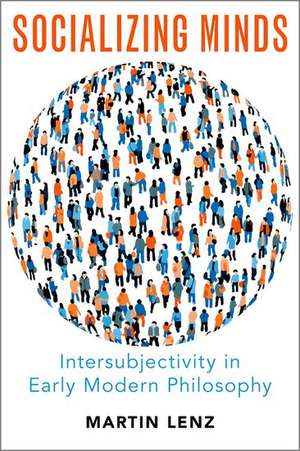Socializing Minds: Intersubjectivity in Early Modern Philosophy
Autor Martin Lenzen Limba Engleză Hardback – 17 oct 2022
Preț: 436.15 lei
Preț vechi: 484.56 lei
-10% Nou
Puncte Express: 654
Preț estimativ în valută:
83.46€ • 87.36$ • 69.46£
83.46€ • 87.36$ • 69.46£
Carte disponibilă
Livrare economică 26 februarie-04 martie
Preluare comenzi: 021 569.72.76
Specificații
ISBN-13: 9780197613146
ISBN-10: 0197613144
Pagini: 272
Dimensiuni: 201 x 137 x 28 mm
Greutate: 0.43 kg
Editura: Oxford University Press
Colecția OUP USA
Locul publicării:New York, United States
ISBN-10: 0197613144
Pagini: 272
Dimensiuni: 201 x 137 x 28 mm
Greutate: 0.43 kg
Editura: Oxford University Press
Colecția OUP USA
Locul publicării:New York, United States
Recenzii
Sometimes the hardest thing to do in philosophy is to ask a new question ... Martin Lenz's great accomplishment in his erudite and thought-provoking book ... is his formulation of a new question by which to investigate the early modern philosophers ... And by bringing Spinoza, Locke, and Hume into conversation with one another, he allows his distinctive take on each to illuminate the others. ... [R]eadings of the philosophy of this period will henceforth have to address the question of intersubjectivity that Lenz has so ably uncovered.
Martin Lenz has given us a powerful and thought-provoking critique of a historiographical orthodoxy.
We students of the early modern period should be doubly grateful for Martin Lenz's new book.... For the project is doubly generative, introducing a robust new conceptual framework, and then putting it through its paces with some fascinating case studies. I look forward to watching others adapt the framework in the service of their own interpretive projects, as well as reckon with Lenz's fecund readings of Spinoza, Locke, and Hume.
Lenz's book is hardly the last word on this topic, and there is much to consider regarding the extent to which intersubjectivity was arising among early modern philosophers. Lenz does us a great service in pushing us to consider more carefully how much of the early moderns' philosophical framework was intersubjective.
Martin Lenz has given us a powerful and thought-provoking critique of a historiographical orthodoxy.
We students of the early modern period should be doubly grateful for Martin Lenz's new book.... For the project is doubly generative, introducing a robust new conceptual framework, and then putting it through its paces with some fascinating case studies. I look forward to watching others adapt the framework in the service of their own interpretive projects, as well as reckon with Lenz's fecund readings of Spinoza, Locke, and Hume.
Lenz's book is hardly the last word on this topic, and there is much to consider regarding the extent to which intersubjectivity was arising among early modern philosophers. Lenz does us a great service in pushing us to consider more carefully how much of the early moderns' philosophical framework was intersubjective.
Notă biografică
Martin Lenz is full professor of philosophy at the Department of History of Philosophy in the Faculty of Philosophy at the University of Groningen (NL), specializing in early modern and medieval philosophy. He has conducted several postdoc projects in Cambridge (2002-2004) and Berlin (2004-2009). After his Habilitation (HU Berlin 2009), he held a visiting professorship in theoretical philosophy at the University of Tübingen (2009-2010) and was director of the Leibniz-Prize research group founded by Dominik Perler (HU 2010-2012).
